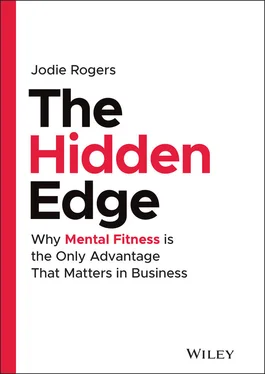But what if you didn't have to wait for challenges and issues to appear before you ‘did the work’? What if you could get ahead of yourself and have a prevention and enhancement approach rather than always having to pay out in time, money, and energy trying to fix or cure? What could that unlock among your people?
Some of the more progressive companies out there have started to realise the importance of enhancement over cure. Unilever is one of these core companies that is trail-blazing the way and has heavily invested in training and education around the idea of the ‘inner game’, because they are fully aware of the importance of investing in the personal development of their people, and empowering them to understand and navigate their own inner world to unlock business growth.
When you have mentally and emotionally healthy people (‘mentally fit’ people), you have resilient and agile teams. When you have resilient and agile teams, you have a healthy and agile business. And when you have a healthy business, it affects the bottom line positively. The work that I do with companies, whether it's leadership work, team sessions, designing programmes for central L&D (learning and development) teams, or taking full functions through learning journeys, is underpinned by my ‘mental fitness’ philosophy, which I will explain more about shortly.
But not all companies have realised this secret. Many are yet to understand that the hidden edge of business lies in the ‘mental fitness’ of your people, and that this is the most overlooked competitive advantage in the marketplace.
In truth, some do know it and either can't access the knowledge they need to act on it or have dismissed it for the more tangible initiatives they can sell in and get easier stakeholder buy-in for. That's not a criticism; we all know how difficult it is to convince people of the importance of such topics, especially when it feels like swimming upstream. Nine times out of 10, what's missing for corporate leaders who wish to dedicate time, money, and energy into figuring this out in their organisation is something measurable and tangible: numbers, metrics, return on investment (ROI). The following chapter presents hard-to-access statistics and financial data on the cost of ignoring mental fitness in organisations, and builds the business case to incorporate the concept of mental fitness into your organisation's culture and strategy for growth. I encourage you to use this business case in your company to persuade key decision-makers to invest in mental fitness. As such, we've made the business case available for download at www.symbiapartners.com/mentalfitnessresources.
I think working together with you [Jodie] has definitely opened my eyes to the importance of teaching people to look after their mental health and treat it as a key asset, something to be enhanced, through the lens of mental fitness. It's something that will help employees be successful in their careers and in their lives more generally. It's a simple but quite profound insight that mental fitness is something you need to work at in the same way you need to work on physical fitness, and ebbs and flows through your life.
– Head of Wellbeing, Global Financial Services
In 2020, the door got kicked open to discuss these topics and I always say that the time to change things is when things are changing. You [Jodie] brought this forward in a structured way with words like mental fitness, which could be scary, and turned that into something that ended up being a relief. You were meeting people where they were. It was great, because I think one of the most powerful things about the way that it was introduced into Peet's was the work to make sure that you and your team were meeting us where we were. We have a very smart group of people and they can understand, but you allowed us to feel it and that difference made a huge impact.
– Shawn Conway, CEO, Peet's Coffee
1 1Sandberg, S. and Thomas, R. (2020) ‘The coronavirus pandemic is creating a “double double shift” for women. Employers must help’, Fortune < https://fortune.com/2020/05/07/coronavirus-women-sheryl-sandberg-lean-in-employers-covid-19/>
2 2Clark, P. (2020, August) ‘“Problems of Today and Tomorrow”: Prevention and the National Health Service in the 1970s’, Social History of Medicine, 33 (3): 981–1000.
3 3Berridge, V. (2003) ‘Post-war Smoking Policy in the UK and the Redefinition of Public Health’, Twentieth Century British History, 14: 73.
4 4Devonish, D. (2016) ‘Emotional Intelligence and Job Performance: The Role of Psychological Well-Being’, International Journal of Workplace Health Management, 9 (4): 428–442.
2 The Business Case for Investing in Mental Fitness
In this chapter, I build a case for how mental fitness contributes to the bottom line in any organisation. Based on data from a variety of sources, it can be a valuable tool for HR and well-being practitioners or managers who need to make the case in their own organisations.
The World Health Organization (WHO) defines good mental health as follows:
‘A state of wellbeing in which every individual realises his or her own potential, can cope with the normal stresses of life, can work productively and fruitfully, and is able to make a contribution to her or his community.’
In other words, good mental health isn't just the absence of ill health, just as good physical health isn't the absence of disease. Many arguments have been made (and often fallen on deaf ears) for the importance of addressing mental illness in the workplace and enhancing well-being.
This work is foundational and fundamentally important. But there is another opportunity here. What if we went beyond illness and wellness and also began to call for a focus on mental fitness in the workplace? As laid out in the last chapter, being mentally fit is about strengthening and enhancing, and just as peak physical fitness might see you through a marathon, peak mental fitness can help people to achieve extraordinary things – to become adaptable, more engaged, more resilient, and more creative in their work. With those sorts of results, why isn't everyone doing it?
Well, because the whole topic of ‘mental’ anything is largely still taboo. But beyond that, it's intangible in many ways. How do we know if we are doing it right? How can we convince stakeholders to invest in something we can't really measure? What IS the ROI? Do we know how it affects the bottom line? Is there a business case that lays out all the facts and figures in a simple, digestible way that I can use to first convince myself, then convince my company? Well, the answer is YES – this is it. In this book, we give you the executive summary version. If you want to access the comprehensive business case, you can download it (along with the summary version) at www.symbiapartners.com/mentalfitnessresources.
What I've done is look at the argument in a number of different ways:
What is the cost of doing nothing? For example, what is the negative impact of acute stress, anxiety, burnout, and depression (mental illness) on business?
What's the benefit of doing something more? For example, how does investing in mental wellness positively affect engagement, retention, and productivity?
Finally, I look at the further positive impact of investing in mental fitness – strengthening and enhancing the mental and emotional well-being of our workforce to positively impact performance.
Mental Health: The Magnitude of the Problem
Poor mental health is a huge cost to businesses and the economy. According to The WHO, the world economy loses about US$1 trillion per year in productivity due to depression and anxiety. That's the equivalent of $130 per person on the planet!
Читать дальше












